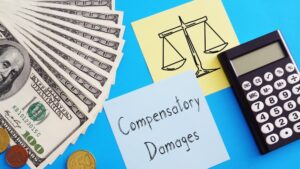How Much Should You Ask for in a Car Accident Settlement?
How Much Should You Ask for in a Car Accident Settlement?
Car crashes that result from other drivers’ negligence frequently leave accident victims in significant pain and in need of ongoing medical treatment. Fortunately, accident victims may be eligible to recover damages for their accident-related losses. The compensation you should ask for – and that you are eligible to recover – in a car accident case will depend upon the available insurance coverage limits, the extent of your injuries, and the cost of your medical treatment.
A car accident lawyer in your area can file a timely personal injury claim on your behalf and pursue the monetary recovery you need to become whole again.
Schedule a Free Initial Consultation
The Most Common Types of Car Accidents
Car crashes come in various forms, each with its causes and consequences. Some of the most common types of car accidents that result in serious injuries include:

- Head-on collisions – Head-on collisions involve the front of one vehicle striking the front of another. These accidents often result in severe injuries or fatalities due to the vehicles’ speeds and the amount of collective force involved. Common causes of head-on collisions include wrong-way driving, overtaking other vehicles on curves, aggressive driving, and intoxicated driving.
- Rollover accidents – Car and truck rollover accidents happen when a vehicle tips over onto its side or roof. Factors contributing to vehicle rollovers include high speeds (especially around sharp curves) and improper truck-loading procedures. Due to their higher center of gravity, SUVs and trucks are more prone to rollovers.
- Rear-end collisions – Rear-end collisions occur when the front of one vehicle hits the back of another. Common causes of these accidents include distracted driving, tailgating, or sudden stops. While often resulting in minor injuries, these accidents can also lead to more severe consequences, especially at high speeds.
- Side-impact (or broadside) collisions – Also known as T-bone collisions, side-impact accidents occur when the front of one vehicle crashes into the side of another vehicle. These collisions can happen at busy traffic intersections, in parking lots, or when one driver fails to yield the right-of-way to another at the proper time.
- Sideswipe collisions – Sideswipe collisions occur when the sides of two parallel-moving vehicles make contact. This can happen when changing lanes without using the proper turn signal or failing to check blind spots before switching travel lanes. While often resulting in minor damage, sideswipe collisions can lead to more significant accidents if the driver loses control of their vehicle.
- Traffic intersection accidents – Traffic intersections are common locations for accidents, often involving right-of-way violations, running red lights, or failure to yield. T-bone collisions, where the front of one vehicle hits the side of another vehicle, are common and can cause significant injuries due to the force of impact.
- Parking lot and parking garage accidents – Parking lot and parking garage accidents are common in crowded areas. They often involve back-up collisions, sideswipe accidents, or rear-end crashes while pulling in and out of parking spaces.
- Multi-vehicle pile-ups – Multi-vehicle pile-ups involve several vehicles colliding like dominoes in a chain reaction. These accidents often result from rear-end collisions that occur at a high speed and with significant force.
- Single-vehicle crashes – Single-vehicle car crashes involve only one vehicle and can occur for various reasons, such as driver distraction, drowsiness, or loss of control. Collisions with fixed objects like barriers, trees, or poles are common examples. If a passenger suffers an injury in one of these accidents, they can file a personal injury claim with the at-fault driver’s insurance company.
If you suffered injuries in one of these accidents that a negligent driver caused, your attorney can take the necessary legal steps to maximize the monetary compensation you recover.
The Most Common Causes of Car Accidents
Car accidents occur for many reasons, but one of the most common reasons is driver negligence and inattention. Some of the most common causes of local car accidents that lead to physical injuries and damages include:
- Reckless driving – Aggressive and reckless driving behaviors, such as tailgating other vehicles, weaving in and out of heavy highway traffic, and ignoring traffic signals, contribute to car accidents. These behaviors heighten the risk of collisions and escalate the severity of resulting injuries.
- Running red lights and stop signs – Failing to obey traffic signals and signs is a common cause of car accidents, often leading to side-impact collisions or intersection accidents. Disregarding these signals can lead to T-bone accidents, which can be particularly severe – especially if the vehicle on the receiving end spins around rapidly or overturns.
- Driving under the influence (DUI) of alcohol or drugs – Alcohol and drug impairment affect a driver’s judgment, coordination, and reaction time. Driving under the influence of alcohol or drugs is a major factor in accidents, often causing drivers to lose control of their vehicles and experience blurred vision, delayed reflexes, and delayed reaction time.
- Excessive speeding – Speeding significantly contributes to the severity and frequency of car accidents. High speeds reduce a driver’s reaction time and increase the force of impact in collisions, leading to more severe injuries and fatalities for everyone involved.
- Distracted driving – Distracted driving is a leading cause of car accidents. Distractions such as texting and driving, talking on the phone without using a hands-free Bluetooth device, eating, drinking, or adjusting in-car entertainment systems divert a driver’s attention from the road, increasing the risk of collisions.
- Fatigued and drowsy driving – Driving while fatigued affects a driver’s alertness and reaction time. Fatigue can lead to lapses in concentration and an increased likelihood of accidents, especially on long stretches of road. Moreover, if a driver falls completely asleep at the wheel, they may lose control of their vehicle, resulting in a single-vehicle accident or a multi-vehicle pile-up.
- Failing to yield the right-of-way to another driver at the proper time – Accidents often occur when drivers fail to yield the right-of-way to other drivers at traffic intersections or during lane changes. Failing to follow traffic rules can lead to collisions with other vehicles or pedestrians.
If you recently suffered injuries in a car crash that another motorist caused, an experienced and compassionate car accident lawyer can meet with you to discuss your case and determine your eligibility for filing a personal injury claim. Your attorney can then take the necessary steps to maximize your monetary settlement or litigation result.
Injuries that Drivers and Passengers May Suffer in a Car Crash
Car accidents can result in a range of injuries for both drivers and passengers, varying in severity based on certain factors. Those factors may include the speed of the collision, the point of impact, and the accident victim’s bodily movements during the crash. Some of the most common injuries that car accident victims suffer include:
- Traumatic head and brain injuries
- Whiplash and other soft tissue contusions
- Fractures and broken bones
- Spinal cord damage
- Complete and incomplete paralysis injuries
- Chest contusions
- Facial contusions
- Airbag and seatbelt injuries
- Burn injuries
- Emotional anguish and mental trauma
- Internal bleeding and organ damage
The type and severity of injuries sustained in car accidents can vary widely. To ensure proper diagnosis and treatment, seeking immediate medical attention after an accident is crucial, even if your injuries seem minor. Additionally, consulting with legal and medical professionals can help you navigate the aftermath of your car accident and pursue the appropriate compensation you deserve for your injuries.
Maximizing Your Monetary Damages after a Car Accident
Car accident victims can legally recover various types (and amounts) of monetary damages to compensate them for the losses they incurred in their accident. These damages aim to address both economic and non-economic impacts on their life. Common types of recoverable monetary damages in a car accident claim or lawsuit include:

- Lost earnings – Compensation for lost income accounts for the income an accident victim should have earned if not for the car accident. This includes both current and future earnings if the injuries lead to a diminished ability to work or an inability to return to their previous occupation.
- Property damage – These damages can include the repair or replacement costs of a damaged vehicle and any personal belongings inside the vehicle at the time of the accident.
- Pain and suffering – These damages compensate car accident victims for their emotional distress and lost quality of life stemming from the accident.
- Related medical costs – Accident victims are entitled to recover the costs associated with medical treatment, surgeries, hospital stays, physical therapy, prescription medications, and future medical care related to the subject car accident.
- Loss of consortium – In car accident cases that involve severe physical injuries, family members may seek compensation for the loss of companionship, support, and services of the injured accident victim.
- Punitive damages – In certain circumstances where the at-fault party’s conduct is particularly reckless or intentional, accident victims may be eligible to recover punitive damages. The primary purpose of these damages is to punish the at-fault driver for causing the car accident.
Recovering these monetary damages requires presenting a compelling case supported by evidence and legal experience. A personal injury attorney can introduce the evidence necessary to satisfy your legal burden of proof and recover favorable monetary compensation for your injuries.
Factors that May Affect the Amount of Your Car Accident Settlement
Several factors can influence the amount of a car accident settlement or jury verdict. The interplay of these factors is complex, and their consideration is crucial when determining the compensation you may receive for your injuries. The amount of money you should ask for in a car accident settlement (and which you may ultimately recover) will depend upon all of the following factors:
- The severity of your injuries – The extent and severity of your car accident injuries play a significant role in determining your overall monetary compensation award. More severe injuries that result in long-term disabilities, extensive medical treatments, or permanent impairments generally lead to higher settlement amounts.
- The amount of your medical expenses – The total medical costs you incurred due to the accident, including emergency care, surgeries, hospital stays, rehabilitation, and ongoing treatments, directly affect the settlement amount you may receive. You may be entitled to recover compensation for all past and future medical expenses related to your accident.
- Lost income and earning capacity – Compensation for lost income, both past and future, is a crucial component of car accident settlements. Your settlement amount may increase if your injuries result in a diminished capacity to work or prevent you from returning to your previous occupation.
- Pain and suffering – Non-economic damages, such as pain and suffering, emotional distress, and loss of enjoyment of life, are subjective but significant factors. These damages aim to compensate you for the intangible effects of the accident on your overall life and well-being.
- Available insurance policy limits – The at-fault party’s insurance policy limits influence the maximum amount of money you may recover in your personal injury claim or lawsuit. If the liable party has minimal coverage, it may limit your compensation, especially if your case involves catastrophic injuries.
- The existence of pre-existing medical conditions – The existence of pre-existing medical conditions may complicate the assessment of damages in your case. However, you may still be entitled to recover compensation for the worsening of any pre-existing medical conditions that your accident caused.
- Jurisdictional differences – Different jurisdictions have varying laws and precedents regarding personal injury claims. Settlement amounts may differ based on these legal nuances.
Navigating the complexities of these factors requires the help of a skilled car accident attorney in your area. A knowledgeable lawyer can assess the specifics of your case, negotiate effectively with insurance companies, and, if necessary, present a compelling case in court to maximize the potential settlement or jury verdict amount you receive.
Talk with a Car Accident Lawyer in Your Area Right Away

Greg Bentley, Car Accident Lawyer
If you suffered injuries in a recent car accident, a skilled personal injury lawyer can work to maximize your total settlement compensation through effective and aggressive negotiation with insurance company representatives. If the insurance company refuses to make you a fair monetary settlement offer, your lawyer can file a lawsuit in court and litigate your case to a prompt and fair resolution. Your attorney will handle every step of the process for you and aggressively fight for your legal rights and interests at all times, helping you maximize the damages you receive for your accident-related losses.


